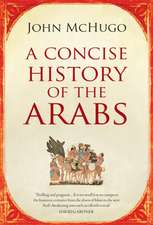Beyond the Arab Cold War: The International History of the Yemen Civil War, 1962-68: Oxford Studies in International History
Autor Asher Orkabyen Limba Engleză Paperback – 7 ian 2020
| Toate formatele și edițiile | Preț | Express |
|---|---|---|
| Paperback (1) | 195.91 lei 32-37 zile | |
| Oxford University Press – 7 ian 2020 | 195.91 lei 32-37 zile | |
| Hardback (1) | 284.34 lei 11-16 zile | |
| Oxford University Press – 3 aug 2017 | 284.34 lei 11-16 zile |
Preț: 195.91 lei
Preț vechi: 224.41 lei
-13% Nou
Puncte Express: 294
Preț estimativ în valută:
37.51€ • 39.13$ • 31.44£
37.51€ • 39.13$ • 31.44£
Carte tipărită la comandă
Livrare economică 03-08 martie
Preluare comenzi: 021 569.72.76
Specificații
ISBN-13: 9780190092450
ISBN-10: 0190092459
Pagini: 312
Dimensiuni: 117 x 226 x 20 mm
Greutate: 0.41 kg
Editura: Oxford University Press
Colecția OUP USA
Seria Oxford Studies in International History
Locul publicării:New York, United States
ISBN-10: 0190092459
Pagini: 312
Dimensiuni: 117 x 226 x 20 mm
Greutate: 0.41 kg
Editura: Oxford University Press
Colecția OUP USA
Seria Oxford Studies in International History
Locul publicării:New York, United States
Recenzii
Until the last two decades, much of the scholarship on Yemen has often been characterized by a tendency, whether intentional or not, to emphasize the isolation of the country, its history, and its politics from global processes of imperial expansion, state formation, and capital accumulation.It is refreshing then to read Asher Orkaby's account of the Yemeni Civil War of 1962-68, which proceeds with the assumption that the war must be understood in a broader context of international relations that can be reduced neither to Cold War rivalries nor to competition between Arab monarchies and their republican rivals. A well-researched study that pushes us to think more carefully about whether the Yemen Civil War, and possibly any civil war, can be considered solely within a national framework.
Backed by solid research, Orkaby's narrative easily succeeds in taking readers beyond the Arab Cold War and into the machinations of a variety of international players.
Through truly impressive multiarchival and multilingual research (in U.S., British, Canadian, Russian, Israeli, Yemeni, and Swiss collections), Orkaby illuminates several key aspects of the Yemeni conflict that were previously shrouded in official secrecy or historiographical neglect.
Orkaby's book represents an important contribution to both the philatelic and political history of this turbulent part of the world.
[P]rovides special significance and important relevance today, half a century later....Recommended.
Backed by solid research, Orkaby's narrative easily succeeds in taking readers beyond the Arab Cold War and into the machinations of a variety of international players.
Through truly impressive multiarchival and multilingual research (in U.S., British, Canadian, Russian, Israeli, Yemeni, and Swiss collections), Orkaby illuminates several key aspects of the Yemeni conflict that were previously shrouded in official secrecy or historiographical neglect.
Orkaby's book represents an important contribution to both the philatelic and political history of this turbulent part of the world.
[P]rovides special significance and important relevance today, half a century later....Recommended.
Notă biografică
Asher Orkaby is Research Fellow at Harvard University's Department for Near Eastern Languages and Civilizations.





























